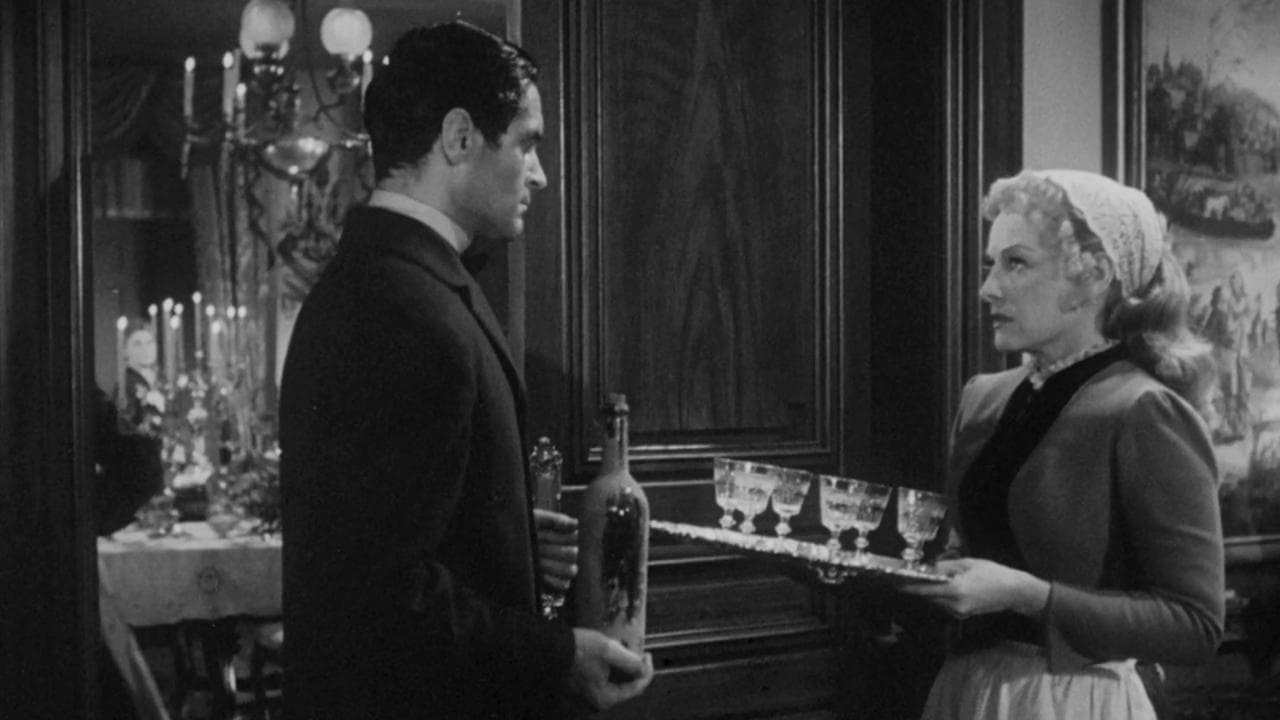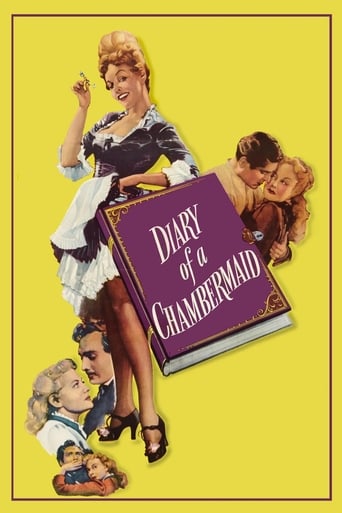

The greatest movie ever!
... View MoreI like movies that are aware of what they are selling... without [any] greater aspirations than to make people laugh and that's it.
... View MoreAmazing worth wacthing. So good. Biased but well made with many good points.
... View MoreIt really made me laugh, but for some moments I was tearing up because I could relate so much.
... View MoreA double-bill of two films transmuting Octave Mirbeau's source novel LE JOURNAL D'UNE FEMME DE CHAMBRE onto the celluloid, made by two cinematic titans: Jean Renoir and Luis Buñuel, 18 years apart. Renoir's version is made in 1946 during his Hollywood spell, starring Paulette Goddard as our heroine Celestine, a Parisian girl arrives in the rural Lanlaire mansion to work as the chambermaid in 1885, barely alighting from the train, Celestine has already been rebuffed by the haughty valet Joseph (an excellently surly Lederer), and confides to the also newly arrived scullery maid Louise (a mousy and dowdy Irene Ryan) that she will do whatever in her power to advancing her social position and firmly proclaims that love is absolutely off limits, and the film uses the literal diary- writing sequences as a recurrent motif to trace Celestine's inner thoughts. The objects of her tease are Captain Lanlaire (Owen), the patriarch who has relinquished his monetary sovereignty to his wife (Judith Anderson, emanating a tangy air of gentility and callousness); and Captain Mauger (a comical Burgess Meredith, who also pens the screenplay off his own bat), the Lanlaire's goofy neighbor who has a florae-wolfing proclivity and is perennially at loggerheads with the former on grounds of the discrepancy in their political slants, both are caricatured as lecherous old geezers with the death of a pet squirrel prefiguring the less jaunty denouement. In Renoir's book, the story has a central belle-époque sickly romantic sophistication to sabotage Celestine's materialistic pursuit, here her love interest is George (Hurd Hatfield), the infirm son of the Lanlaire family, a defeatist borne out of upper-crust comfort and has no self-assurance to hazard a courtship to the one he hankers after. Only when Joseph, a proletariat like Celestine, turns murderous and betrays his rapacious nature, and foists a hapless Celestine into going away with him, is George spurred into action, but he is physically no match of Joseph, only with the succor from the plebeian mob on the Bastille Day, Celestine is whisked out of harm's way, the entire process is shrouded by a jocose and melodramatic state of exigency and Renoir makes ascertain that its impact is wholesome and wonderfully eye-pleasing. In paralleled with Buñuel's interpretation of the story, Renoir has his innate affinity towards the aristocracy (however ludicrous and enfeebled are those peopled) and its paraphernalia, the story is less lurid and occasionally gets off on a comedic bent through Goddard's vibrant performance juggling between a social-climber and a damsel-in-distress. The same adjective "comedic", "vibrant" certainly doesn't pertain to Buñuel's version, here the time-line has been relocated to the mid-1930s, Celestine (played by Jeanne Moreau with toothsome reticence and ambivalence) more often than not, keeps her own counsel, we don't even once see her writing on the titular diary, she works for Mr. and Mrs Monteil (Piccoli and Lugagne), who are childless but live with Madame's father Mr. Rabour (Ozenne, decorous in his condescending aloofness), an aristo secretly revels in boots fetish in spite of his dotage. Here the bourgeois combo is composed of a frigid and niggardly wife, a sexed-up and henpecked husband (Mr. Piccoli makes for a particularly farcical womanizer, armed with the same pick-up line), a seemingly genteel but kinky father, and Captain Mauger (Ivernel), here is less cartoonish but no less uppity, objectionable and erratic; whereas Joseph (Géret), is a rightist, anti-Semitic groom whose perversion is to a great extent much more obscene (rape, mutilation and pedophilia are not for those fainted hearts). Amongst those anathemas, Celestine must put on her poker face, or sometimes even a bored face to be pliant (she even acquiesces to be called as Marie which Goddard thinks better of in Renoir's movie), she is apparently stand-offish but covertly rebellious, and when a heinous crime occurs (a Red Riding Hood tale garnished with snails), she instinctively decides to seek justice and tries insinuating her way into a confession from the suspect through her corporeal submission, only the perpetrator is not a dolt either, unlike Renoir's Joseph, he knows what is at stakes and knows when to jettison his prey and start anew, that is a quite disturbing finale if one is not familiar with an ending where a murderer gets away with his grisly crime. But Buñuel cunningly precedes the ending with a close-up of a contemplating Celestine, after she finally earns her breakfast-in-bed privilege, it could suggest that what followed is derived from her fantasy, which can dodge the bullet if there must be. Brandishing his implacable anti-bourgeoisie flag, Buñuel thoughtfully blunts his surrealistic abandon to give more room for dramaturgy and logical equilibrium, which commendably conjures up an astringent satire laying into the depravity and inhumanity of the privileged but also doesn't mince words in asserting that it doesn't live and die with them, original sin is immanent, one just cannot be too watchful. Last but definitely not the least, R.I.P. the one and only Ms. Moreau, who just passed away at the age of 89, and in this film she is a formidable heroine, brave, sultry and immune to all the mushy sentiments, whose fierce, inscrutable look is more than a reflection of her temperaments, but a riveting affidavit of a bygone era's defining feature.
... View MorePaulette Godard has never been more than the faintest blip on my personal radar but that, of course, may be my problem rather than hers. Her particular allure and/or charm has always eluded me and I've never accused her of being anything more than competent in the Acting department. That out of the way I have to say she makes a reasonable fist out of Celestine, the gold-digging chambermaid who fetches up in one of those eccentric households that are the backbone of Fiction, Theatre and Silver Screen. In something of a twist on a prevailing trend expatriate Jean Renoir opted to shoot a French story in Hollywood though he would, of course, also shoot American subjects there along with Max Ophuls who clearly became infected with the same bug as Renoir and made Letter From An Unknown Woman there two years later. The semi-classic novel which had also been dramatised for the stage was given a new lick of paint by actor Burgess Meredith - married to Godard at the time - who, as Producer, cast himself as the elderly Captain rather than the love interest, no doubt in an effort to display another of the strings on his bow. It's a strange melange and the presence of Judith Anderson should be sufficient to alert the cognoscenti to the tone - this time around she encourages a servant to seduce her son - and overall this is a movie that needs to be viewed more than once in order to formulate a balanced opinion.
... View MoreI cannot pretend to explain all the allusions and metaphors Renoir intended to convey with this impressionistic comedy. Paulette Goddard, as the main character, is magnificent. She conveys her feelings and thoughts through her diary, but in a manner that is always blurry and full of confusion. And speaking of confusion, Hurd Hatfield is on hand as the scion of the odd home. Burgess Meredith, Francis Lederer, and Irene Ryan all add terrific seriocomic support in their roles.Be prepared to experience many conflicting feelings while viewing this film.
... View More(WARNING - CONTAINS MILD SPOILER) The film is first of all a charming, well-shaded portrait of the foibles and oddities of a complex household, reveling in such easy diversions as neighbour Meredith's eccentric feud with the master of the house, and initially casting Goddard as a straightforward gold-digger - her performance is beautifully ambiguous in the way she might or might or not be genuine in her response to her various suitors. Later (and not entirely smoothly; some scenes, and the thing as a whole, feel a bit forced and/or abbreviated) it turns into a quivering, troubled parable on unravelling patriarchal and political structures - the scene where the household carries out its bizarre, defiant, hopeless ritual of anti-revolutionism is amazing. Lederer's mutation into a murdering capitalist is a bit overstated; as is the underlining of Goddard and Hatfield's rebellion across class lines by having him triumph over a debilitating illness, but all is justified by the film's superbly orchestrated crowd scene climax, which has the chaotic sweep of real history and perfectly places the human melodrama in its proper context.
... View More